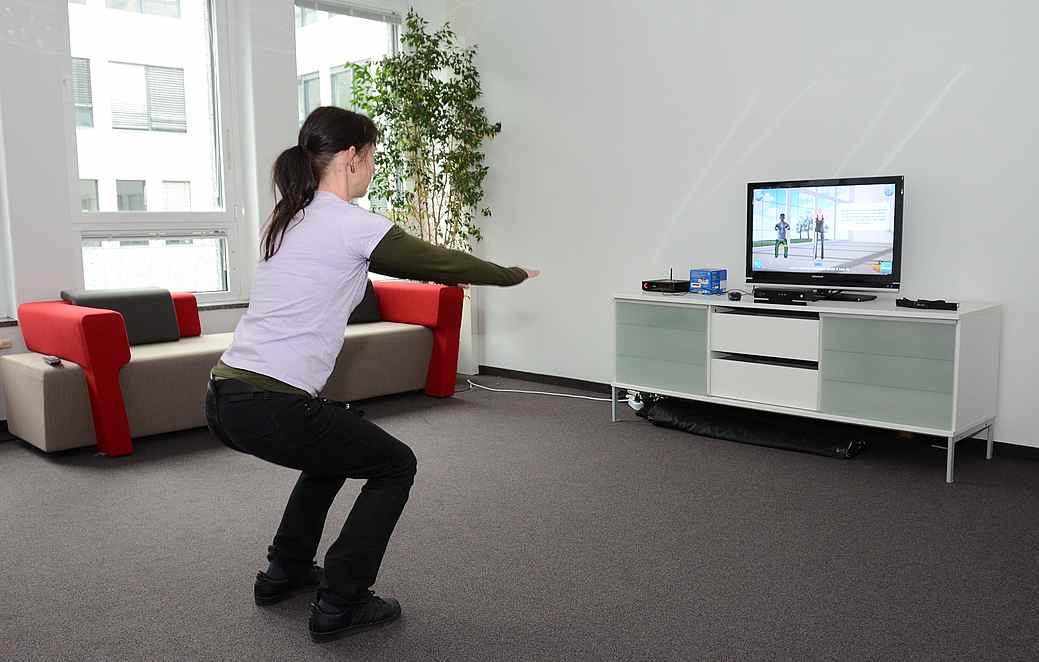How the start-up eGeia is bringing rehab into your own living room
If you’ve survived a medical emergency or a major operation, rehabilitation measures usually follow. However, rehabilitation treatments are time-consuming and therefore not always easy for patients to integrate into their everyday lives. In structurally weak areas, the distances people have to travel for their therapy are often long, and patients are limited in their mobility particularly after a hip operation or a fracture. In addition, there is a shortage of qualified physiotherapists: those who urgently need physiotherapy usually have to make numerous calls before a place is found or they end up on waiting lists.
The Potsdam-based startup eGeia shows that things can be different in the future with its eHealth product MeineReha. The startup brings the rehabilitation centre and the therapist into your own living room. The eGeia GmbH team managed to do this by developing a software as part of its work at the Fraunhofer Institute’s FOKUS to record movement data and provide guidance for a digital exercise programme. A sensor box connected to the TV set enables the patient to see a mirror image of themselves as they are performing the movements. The intelligent algorithm is able to recognise the person in the room and abstract them from the environment. The sensor measures the individual limbs, the arms and leg movements three-dimensionally in real time and keeps an eye on sequences and even angular dimensions during each exercise. Is the squat in the right position? Does the upper body need to be bent more? The programme then analyses the data and also transmits the progress of the therapy from the previous weeks to the therapists. This means that patients can perform the exercises flexibly at any time, but are still not left to their own devices.
“MeineReha is effectively the extended arm of the therapist,” says managing director Maciej Piwowarczyk vel Dabrowski. Therapists aren’t replaced by their digital assistants - in many cases, communication will be even more personal and direct. In addition, no one in the back row will be overlooked unlike in a crowded training room. On the contrary, thanks to the analysis and recording, the therapist can keep a close eye on every movement. If an exercise doesn’t quite work or feels really painful, patients can get in touch and ask for help. The system sends the request to the therapists whose interface collects all the data. They can then see the current status of the therapy process, but also access the patients’ records or use the communication tool. Therapists can also be connected directly via an integrated video conference and correct the exercises. The same applies to the analyses: the objective measurements are more accurate than judging by eye. The additional information means that it is even possible to improve or extend the diagnosis or therapy in some cases.
Half an hour of daily exercise in front of the TV: the procedure almost resembles an online fitness programme for the patients. But the medical component is paramount to MeineReha. “Our system was developed together with therapists and doctors. We meet the safety regulations and are currently working on regulatory approval as a medical product. The quality standards required are enormous because the system can’t make any mistakes or any mistakes must be detectable. Our system must function at least as well as humans, and that’s what it is doing,” says Managing Director Piwowarczyk vel Dabrowski. In the future, it is conceivable that one might also offer physiotherapy, physical prevention work, aftercare or preventive care in addition to rehabilitation care.
The system is designed in such a way that even older people can operate it with ease. The webcam is integrated, the special sensor and the software are supplied. All the digital rehab needs is a power supply and a TV set to get started. Since the focus is on movement, the camera only provides a video section of the patient’s body. The living room’s furniture, the colour of the sofa or the wallpaper are not filmed and thus privacy is preserved. It is also important for data protection that the patients can themselves then decide whether they want to send the video of their exercises or just the measurement data to the therapists.
The need for teletherapy has increased particularly during the Corona pandemic. At the same time, the acceptance of digital services has increased. Webcams, digital meetings or conferences have become an integral part of our everyday life. And the Federal Government’s Digital Healthcare Act (DVG) is also making it easier to bring digital health applications onto the market and connect with the reimbursement models of the health insurance funds.
Apart from “eGeia active”, eGeia’s product range includes advice about the approval of medical devices and data protection. They support customers who want to optimise certain areas or digitise processes. This is because the German healthcare market is strictly regulated and abounds with complex requirements. Technology and processes are closely scrutinised. Its base in the Science Park at Potsdam-Golm means that the company is also able to benefit significantly from the exchange and cooperation between science and business. The health tech scene there is driving the digitisation of the health system, not least in order to reduce supply bottlenecks in the future and improve general medical care.
About MTH Blog
The media technologies of the future are already being used today – not only in the entertainment sector, but also in a wide variety of industries. Christine Lentz meets up with tech enthusiasts, established companies and researchers for our monthly MediaTech Hub Potsdam blog to tell the stories behind the innovative business models.



